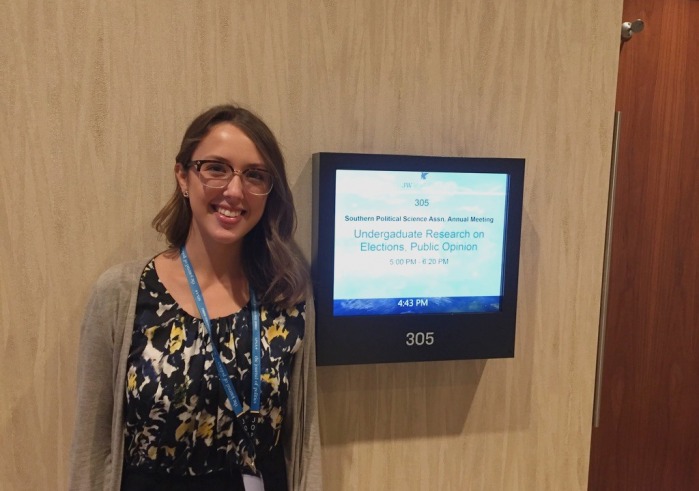Southern Political Science Association Conference 2019

Ana Schugurensky, Class of 2020 (pictured)
During January 17–19, 2019, I had the incredible opportunity to attend and present at the annual Southern Political Science Association conference in Austin, Texas I attended a total of 11 panels where I listened to three to five presentations of papers per panel, as well as the discussions that followed those presentations. The presenters were typically PhD students seeking feedback on their dissertations or professors sharing their research. After a few panel sessions, I realized I kept going back to the same conference rooms, which to me meant that certain topics (public policy, electoral politics, and political psychology) definitely spoke out to me more than others. I was excited to come to this realization as I now feel more confident in the areas of study I want to pursue in my master’s degree.
At the panels, I noticed that there was a sequential order in which research is typically conducted (research question -> past literature -> theory -> hypotheses -> dependent/independent variables by hypothesis -> methods -> results -> implications). I mostly knew this, but the part about having specific theories to base your hypotheses was really reinforced for me. For example, one paper presentation explored the differences between parties via presidential candidates’ speeches during primary debates to see if their diction utilized more care vs. harm words, an emphasis on fairness vs. cheating, ingroup vs. betrayal frames, etc. based on the moral foundations theory. I had no idea that this framework existed and I found the thought of doing a content analysis with a “moral foundations dictionary” new and exciting.
At first, I was a bit intimidated by the size of the conference, even more so because I was the only person from SUA in attendance. However, because I did not know anyone I was forced to step out of my comfort zone and engage in meaningful interactions with other students and professors. By speaking with academics, I could better figure out how to pursue the paths I am interested in within political science (which are currently public policy and political psychology). I also got great advice about which graduate schools best suit my interests, as well as some tips on how to best prepare for applications to those schools.
I have no doubt that when I look back on this conference in the future, I will see that the opportunity of presenting my own research on a panel as only a third-year undergraduate student served as a life-changing event in terms of my academic trajectory. I have been working on this project since May 2018 and to be able to share it with others was quite a meaningful experience. I was able to receive great feedback that will help me with my research in the future, starting with my capstone. I look forward to picking a topic for my thesis, conducting research, and doing more intricate statistical analyses in order to dig deep and produce some interesting findings.
I am greatly appreciative of the SBS concentration for supporting me in my academic endeavors and encouraging me to attend and present at this conference. It was an experience I will never forget and I look forward to continuing my studies in the social sciences field.
